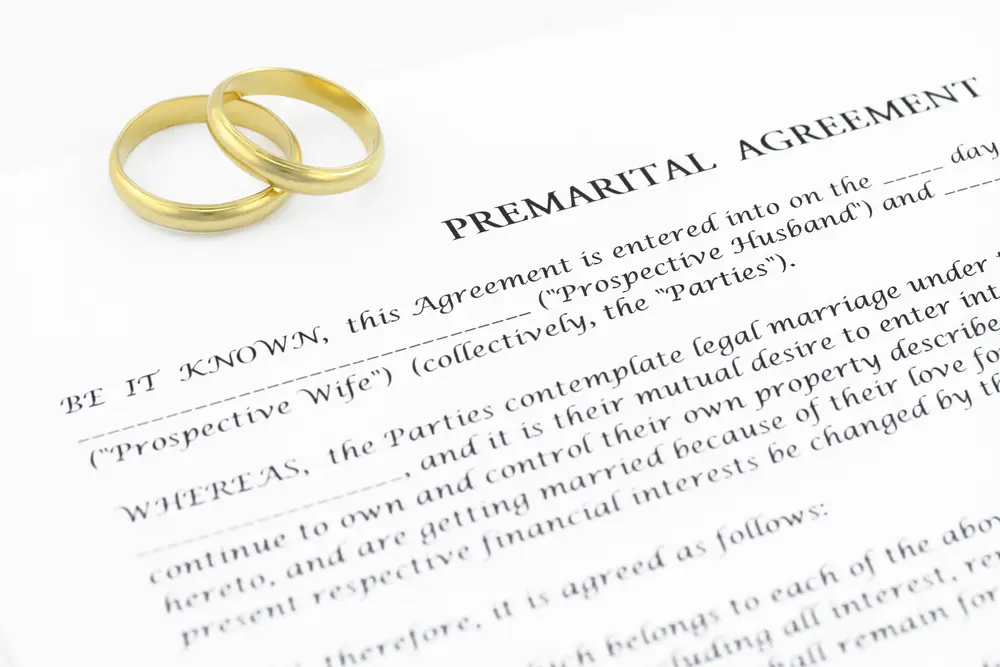We have all heard people facing divorce lament that they will “lose all their stuff” in the divorce, whether that is actually true or not.
For many people, the uncertainty of what could happen to their assets and property or money in a divorce is a deterrent to even getting married in the first place. It should not, and need not, be or feel this way, and one way that couples can go into a marriage with some security should things not work out as planned is through the use of prenuptial agreements, executed before marriage, and postnuptial agreements, which are executed during the marriage.
What Do These Agreements Do?

Both of these types of agreements do the same thing: they set forth the rights of the spouses in the event that there is a divorce later on down the road.
These agreements are most often used to protect property or assets, providing that one spouse or the other will or will not receive certain property or setting out how much of a given asset each spouse would get in the event of a divorce.
These agreements can also provide or take away rights to alimony, but they cannot be used for predetermined rights that have to do with children, such as custody, timesharing, or child support.
Marital and Non-marital Property
Pre and postnuptial agreements will often list property that is owned by the couple, or list property that either one spouse, individually, is bringing into the marriage. The agreement will often state that the property or assets will remain that of one spouse or another, even on divorce.
These agreements often prevent the common problem of non-marital property from becoming marital upon marriage.
For example, even though a wife may have had, started, and owned a business before marriage, if the couples are married, and the assets of the business are used for marital purposes, or if the husband puts marital time, money, or assets in the business, that could transform the business from non-marital (the wife’s alone) to marital property subject to division by a court.
However, the use of prenuptial and postnuptial agreements avoids this problem. You can state that whatever asset you want that is non-marital stays that way.
Prenuptials can even state who gets property when that property or asset does not exist at the time the contract is executed. So, for example, it could say that should either spouse start a business or get an inheritance in the future, the assets will remain the property of that spouse.
Protection for Relatives
Because pre- and postnuptial agreements ensure that nonmarital property listed in the agreement stays that way, they can also allow relatives more freedom to give assets to the marriage.
So, for example, a wife’s mother who wants to pay for the couple to own their first home can ensure that the husband does not get the home in the event of a divorce, so long as the spouses agree to this in the agreement. Relatives are free to give whatever they want to the marriage safely, knowing that if there is a divorce, their relative will get that asset or property.
Use and Possession of Property
These agreements can also provide other benefits that do not have to do with which spouse gets what.
For example, parties can agree on who will get to use or live in the marital home while the divorce is pending. It can state which spouse gets to use other assets, like vehicles, boats, or other benefits.
If spouses own a business, it can address what happens to both spouses in relation to the business—for example, whether both spouses will continue to get dividends or profits from the business, and what level of management both spouses will continue to have in the business.
Elective Share
Parties can also waive elective share in pre- and post-nuptials. The elective share is property one spouse gets from the other, should the other spouse pass away. Parties may prefer that children of a prior marriage, parents, or some other relative receive their assets instead of the new spouse, and this can be accomplished through a pre or postnuptial.
Attorneys Fees if There is a Divorce
The agreements also can state who will pay attorneys fees in the event of a divorce, including temporary fees, incurred while the divorce is going on. This can avoid a situation where a spouse with lesser assets feels powerless in a divorce, or feels like they “can’t afford a divorce.”
While these agreements cannot alter any rights regarding child custody or child support, knowing that the other spouse will have to pay attorneys’ fees can help a spouse fight for rights regarding the children, if need be, in a divorce.
Flexibility
Because these are both contracts, you and your spouse are free to tailor them how you see fit. You can include all your assets or only some of them. You can state who gets what asset in a divorce or come up with a method or formula to be used later on in the event of divorce that will tell the spouses how much of a given asset that they get. You can determine in advance how assets that don not have a definitive value will be valued or appraised.
Making Them Legal and Enforceable
Both pre and postnuptial agreements are similar in their procedural requirements—that is, what it takes to make them legally binding and enforceable.
One absolutely mandatory requirement is that both parties must disclose to the other, in full, all of the assets that they own before the contract is signed. It does not matter that the other spouse may know what you own anyway. Disclosures of every kind of asset (often done with a financial affidavit form) are mandatory.
Also mandatory is providing the other side the opportunity to get their own attorney if they so choose. When it comes to prenuptials, that means that the agreements must be exchanged with enough time for both parties to get their own attorney. Parties should never coerce, pressure, or threaten the other spouse, in order to get them to agree to either type of agreement.
Both agreements can be challenged if they are not executed properly and with these procedural requirements, so it is important to make sure you are not pressuring the other spouse to sign and to make sure you have fully disclosed to the other spouse every asset that you own.
Let us help you get some peace of mind with enforceable pre or post nuptial agreements.
Anthony J. Diaz is an experienced family law attorney focusing on Mediation and Collaborative Divorce. His offices are located at 2431 Aloma Ave Suite #124, Winter Park, FL. 32792 and 3720 Suntree Blvd., Suite 103G, Melbourne, FL. 32940.
You may contact Anthony Diaz by calling 407-212-7807 or by email an*****@************aw.com or visit anthonydiazlaw.com for more information.
And if you found this article helpful, please leave us a review HERE.

